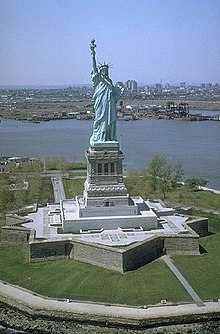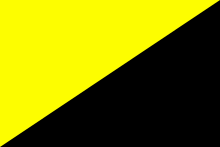Libertarianism
![]()
This article is about the direction of political philosophy. For the position on free will, see libertarianism (philosophy of mind).
Libertarianism (from French: libertaire, "freedom-loving"; from Latin: libertas, "freedom") is a political philosophy and movement that upholds individual freedom as a core principle. Libertarians seek to maximize autonomy and political freedom and emphasize free association, choice, individualism, and voluntary association. Libertarians share a skepticism of authority and state power, but some libertarians diverge in the extent of their opposition to existing economic and political systems. Different schools of libertarian thought offer a range of views regarding the legitimate functions of state and private power, often calling for the curtailment or dissolution of coercive social institutions. Various categorizations have been used to distinguish different forms of libertarianism. Scholars distinguish libertarian views on the nature of property and capital, usually along left-right or socialist-capitalist lines.
The main issue here is the degree to which a state may set rules for each of its citizens. In the political spectrum, then, libertarianism is the antithesis of authoritarian politics.
Some authors draw the libertarianism-authoritarianism axis independently of another main ideological axis, which refers to the scale socialist versus capitalist and distinguishes left from right libertarianism. Between these, there is disagreement primarily over property rights and in the natural law or utilitarian justification of individual freedom. Left and right currents within libertarianism thus differed in their views on the limits and acquisition of property rights.
Within libertarianism exist minarchist and anarchist currents. Libertarians, who advocate a strict minimal state, are distinguished from two other groups who demand a greater or lesser role for government: Anarcho-capitalists, for whom the minimal state is too large, and Classical Liberals, who concede some openness to the provision of public goods by the state.
The term libertarian for anarcho-communists, which originated in France around 1860, was able to establish itself primarily in the English-speaking world and is today considered a somewhat broader, but basically equivalent synonym for anarchist.

The Statue of Liberty is a frequently used symbol of libertarian parties, media, and groups.
Overview
Because of the numerous different currents and positions, it is not possible to present a unified theory of libertarianism, but only different variants of libertarianism. Within libertarianism exist several different currents, some of which do not recognize each other as "libertarian". The guiding norm here is the idea of negative freedom of action.
A fundamental postulate shared by all groups of libertarianism is that each person belongs only to himself and not to the community and has a right to self-ownership. The individual is always prior to the state, has defensive rights against violent interference by others, and freedom is the only thing that can be demanded from others. Robust property rights and economic freedom are central to this, which results in a social order borne of free development and not in conflict with it. Moreover, current state functions should be abandoned or transferred to private hands.
However, there is no all-encompassing unanimity on concrete property rights as well as in the natural law or utilitarian justification of individual freedom. In particular, a distinction is therefore made within libertarianism between left-wing and right-wing currents, which differ in their views on the limits and acquisition of property rights.
Well-known historical representatives are Friedrich August von Hayek, Milton Friedman, Roland Baader, Ludwig von Mises and Murray Rothbard.
Libertarian directions
Libertarian philosopher Roderick T. Long makes a basic distinction between libertarian capitalism, libertarian socialism, and libertarian populism, three distinct social movements whose commonality lies primarily in their reference to a coherent or at least overlapping intellectual heritage.
Anarcho-Capitalism
Anarcho-capitalism is mainly represented by Murray N. Rothbard and David Friedman.
Rothbard thereby draws the conclusion that all tasks assigned to the state, including traditional ones such as internal and external security, should be transferred to the market. In contrast to classical liberalism, which regards a minimum endowment of state institutions as necessary, the blurring of the boundaries between liberalism and anarchism is thus characteristic of this libertarianism.
Under an anarchy of private property, individual rights and market forces would reign unrestricted. While libertarians, who want small government, hold this position to avoid abuse, anarchists hold that only without the state altogether is this possible. In the past, different private legal systems, each in competition with the other, already functioned, as would be true today in times of international trade. Moreover, there have already been successful private security services before a state police force, which have pursued criminals.
Left Libertarianism
Furthermore, in recent years a direction has emerged from the American libertarian tradition that understands libertarianism as a left philosophy and sees potential for broader support for libertarianism on the traditional left. Advocates of left libertarianism include, for example, Hillel Steiner, Peter Vallentyne, and Michael Otsuka. This left-libertarian discussion draws on both the liberal tradition and anarchist positions. One difference from anarchism is that left-libertarians do not advocate the abolition of property, but rather a more equitable distribution of natural resources.
Left-libertarian mutualists such as Kevin Carson also see themselves as opponents of managed economies, and strongly advocate free market economics against the collusion of big business and government. Chris Sciabarra develops a dialectical libertarianism and opposes paleolibertarianism, arguing that a libertarian economic order is incompatible with conservative social policies.
Left-libertarianism has developed from Georgism, mutualism and individual anarchist currents and strives for a combination of self-ownership and equitable distribution of resources. Here the community is granted, at least in advance, a common right to natural resources. The owner would have to make a payment to the community.
Right Libertarianism
Paleolibertarianism was founded in the United States by Lew Rockwell. A major center of this school of thought is the Ludwig von Mises Institute of Alabama, whose ideological tenets are based on ideas of Ayn Rand and Murray Rothbard. Paleolibertarianism or Libertarian Populism is a mixture of libertarianism in the political and economic spheres and cultural conservatism in social issues. This social conservatism distinguishes paleo-libertarian from anarcho-capitalist currents, in which personal and economic liberty are equally important. Murray Rothbard argues that libertarianism is nothing more than a restatement of the beliefs of the Old Right, which rejected state intervention through the New Deal in the early 20th century. In a 1992 essay on right-wing populism, Rothbard deplored the defeat of Ku Klux Klan leader David Duke and accused the media of anti-Duke hysteria.
Individual representatives of right-wing libertarianism take a critical view of democracy as a form of state. Murray Rothbard justifies this with the fact that every state, even a democratic constitutional state, violates the natural, individual rights, since it is ultimately a monopolistic institution of coercion and force. Hans-Hermann Hoppe sees a monarchy as a lesser evil and justifies this by saying that the state is privately owned and the monarch has a personal interest in the welfare of his property, whereas this is not the case with politicians and civil servants in a democracy. Hoppe emphasizes, however, that he is a proponent of a form of anarcho-capitalism and does not consider monarchy, democracy, or any other form of government desirable. Hoppe is co-editor of the journal eigentümlich frei, which is considered the intersection of economic libertarianism and the intellectual new right.
In recent times, a rapprochement between libertarians and right-wing populists can be observed in the United States, which, however, is based more on the common enemy image of the Democrats than on genuine ideological common ground. The right to bear arms, enshrined in the United States Constitution, is also a concern of both movements. The Tea Party movement recruits its followers from the libertarian camp in addition to supporters of Ronald Reagan's policies and Barry Goldwater's tradition. Entrepreneur and Trump supporter Robert Mercer supports both the libertarian Cato Institute, but is also involved in the conservative Heritage Foundation and the ultra-right news portal Breitbart News.
Washington Post writer Matthew Sheffield sees the far-right alt-right as influenced by the anarcho-capitalist and paleo-libertarian mastermind Murray Rothbard, particularly on his reflections on race and democracy, and traces Donald Trump's brute rhetoric to Ron Paul's 2008 presidential bid. As early as 1976, the Koch brothers-backed libertarian magazine Reason published a series of articles that relativized the Holocaust and spoke favorably of the apartheid government in South Africa. Anarcho-capitalist Jeffrey Tucker, however, emphasizes the contradiction between the individual freedom of libertarianism and the group identity and tribalism of the Alt-Right.
Prominent representatives of paleolibertarianism in the United States also include Republicans Ron and Rand Paul. In Poland, politician and member of the EU Parliament Janusz Korwin-Mikke represents both libertarian and sexist/racist ideas.
In practice, Augusto Pinochet's economic policy in the 1970s, influenced by the Chicago Boys, already revealed libertarian traits. José Piñera, who belonged to the Chicago Boys, moved to the Cato Institute after the end of the Pinochet regime. In Brazil, Jair Bolsonaro is influenced by similar ideas.

Some anarcho-capitalist groups use the gold and black flag as a symbol (e.g. AnarkoKapitalistisk Front of Sweden).
Questions and Answers
Q: What is libertarianism?
A: Libertarianism is a political ideology that advocates for less government control over people's lives and prioritizes maximum individual liberty.
Q: What is the belief of libertarians in giving people more free choice?
A: Libertarians believe that it is generally better to give people more freedom of choice.
Q: According to libertarians, who can do things better than the government?
A: Libertarians argue that ordinary people can often do things better than the government.
Q: What kind of economics do libertarians usually support?
A: Libertarians usually advocate for a capitalist economy but with more liberal freedoms.
Q: How does left-wing libertarianism differ from right-wing libertarianism?
A: Left-wing libertarianism and right-wing libertarianism differ in terms of their political beliefs, but libertarians do not always adhere to left-vs-right politics.
Q: What are the roots of libertarianism?
A: Libertarianism has its roots in classical liberalism, anarchism, and the Austrian School of economics.
Q: Are all libertarians part of the sovereign citizen movement?
A: No, not all libertarians are part of the sovereign citizen movement.
Search within the encyclopedia